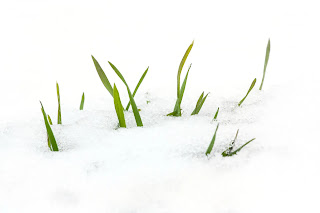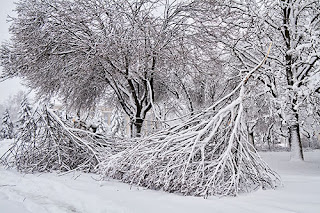PROS –
• Fresh snow works like a cozy blanket as it covers plants. Snowflakes contain tiny pockets full of air, and when they accumulate on the ground they heap together and form larger and warmer air pockets. This air can prevent the soil from freezing and allows roots to continue thriving and taking up water to supply the plant. This is especially true in those areas where sudden low temperatures are not expected to last a sustained amount of time.
• Snow forms a barrier to keep drying and damaging winter wind from bark and delicate plant leaves.
• A layer of snow can protect a plant from the worst effects of the freeze-thaw phenomenon. This is when ice causes the ground to expand when it freezes and constricts when it thaws. The end result of this can be favorable for the soil by creating a lighter, more friable soil that new plants in spring and overwintering bulbs will appreciate. In the worst case, freeze-thaw can turn bulbs into mush and uproot plants. A layer of warming snow can reduce this likelihood.• Snow holds water in the soil and, as it melts, it slowly waters the area. This is especially beneficial for emerging perennials.
• There is an old saying that snow is “Poor Man’s Fertilizer”, and, like many old sayings, it turns out to be true. As snowflakes make their long fall down to earth they accumulate nitrogen and other micronutrients along the way. These elements are then slowly released into the soil as it melts. Even dormant plants can absorb nitrogen deposited in this way.• Snow can enhance the sunlight given to plants. The brightness of the snow causes light to shine all around and even down through it so that plants can continue to photosynthesis through the darkest months of winter.
• Snow cover can hide the egg cases and chrysalis of many beneficial insects and moths and protect them from predation.
CONS –• Snow creates cover for hungry animals like voles, who work underground, but also serves as a step up for those that prey on bark, branches, and leaves. When the snow hides their close-to-the-ground food sources, those lighter creatures can easily scamper up it to feast on plants. Be watchful for tell-tale tracks and take gentle steps to keep them away from your plants.
• In areas where there was drought the previous summer (which is almost everywhere nowadays), trees and shrubs that go into winter drought-stressed may have little left to fight off the cold. While there is little that can be done once the cold has arrived and the snow has fallen, this should be a reminder to prepare your plants for tough winter weather by first preparing them to get through a tough summer. For more on this, check out this article.• Snow can provide a safe place for beneficial insects but is also works to protect less desirable entities like snails, slugs, overwintering insects, and molds. Keep a careful eye on what emerges not just after the snow, but as everything truly warms up in spring. Remember that early and pro-active treatment of pests and pathogens is the most effective treatment overall, so an early problem does not have to develop into a mid-season infestation.













No comments:
Post a Comment